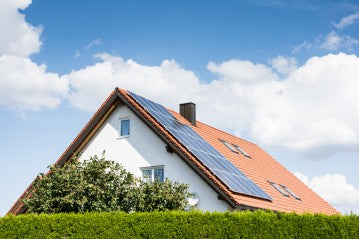
As more homeowners embrace the benefits of solar energy, questions arise about the safety and security of solar panel installations. One such concern is whether grounding is necessary for a solar panel system. In this blog post, we will explore the importance of grounding in solar panel installations and address common queries related to the topic. So let's delve into the world of solar energy and discover the significance of grounding.
Do solar panels attract lightning?
When considering the safety of solar panel installations, it's natural to wonder if these systems attract lightning. The answer is both yes and no. While solar panels themselves do not attract lightning strikes, their elevated position on rooftops or in open areas can make them susceptible to lightning strikes due to their exposure. However, it's important to note that the likelihood of a solar panel being struck by lightning is relatively low.
What happens when lightning strikes a solar panel?
If, by unfortunate chance, lightning does strike a solar panel, the consequences can be severe. Lightning carries an immense amount of electrical energy that can damage the delicate components of the solar panel system. It can cause immediate destruction or long-term damage that affects the system's performance and safety.
How can I ground my solar panel installation?
Grounding your solar panel installation is crucial to mitigate the potential risks associated with lightning strikes. Grounding provides a safe path for electrical currents to dissipate harmlessly into the ground, protecting your solar panel system and minimizing the risk of damage to your property or appliances.
What does grounding do?
Grounding serves several important functions in a solar panel installation:
a. Lightning Protection: By grounding the system, you provide a designated pathway for lightning-induced electrical surges to travel safely into the ground. This protects the system's components from damage and minimizes the risk of fire or electrical hazards.
b. Equipment Protection: Grounding helps safeguard your solar panel system from electrical faults and surges that may occur due to internal issues or external factors, such as power grid fluctuations or nearby lightning strikes. It helps prevent damage to inverters, charge controllers, and other sensitive equipment.
c. Personnel Safety: Grounding ensures the safety of individuals working on or near the solar panel system. In the event of a fault, grounding allows the excess electrical current to flow harmlessly into the ground, protecting people from electric shocks.
How do I ground my Solar system?
Properly grounding your solar panel system is best done by a qualified professional. Here are the key steps involved in grounding a solar installation:
a. Grounding Electrode: A grounding electrode, usually a copper rod or plate, is securely installed in the ground near the solar panel array. It provides a direct connection between the system and the ground.
b. Bonding Conductor: A bonding conductor, typically made of copper or aluminum, connects the solar panel frames, support structures, and other metal components to the grounding electrode. This ensures a continuous path for electrical current in the event of a fault.
c. Proper Wiring: All electrical components of the solar panel system, including inverters, charge controllers, and batteries, should be correctly connected to the grounding system following local electrical codes and regulations.
d. Inspection and Maintenance: Regular inspection and maintenance of the grounding system are essential to ensure its ongoing effectiveness. Periodically checking the connections and monitoring the system's performance can help identify and address any potential issues.
Conclusion
Grounding your solar panel installation is an important safety measure that helps protect your system, your property, and the people around it. While solar panels themselves do not attract lightning, their elevated positioning can make them vulnerable to strikes. By properly grounding your solar panel system, you reduce the risk of damage from lightning-induced surges and electrical faults, ensuring the safety and longevity of your investment.
If you're considering installing a solar panel system, consult with a reputable solar installer who can guide you through the process and ensure that proper grounding measures are in place. Remember, safety should always be a top priority when harnessing the power of solar energy.
Harness the sun's energy, stay grounded, and enjoy the numerous benefits of solar power for years to come!
Ecgsolax has been a key player over the last decade as demand for quality renewable energy solutions has been booming. We never stop innovating because we know how much clean energy means. At Ecgsolax, we offer a wide range of solar products, such as deep cycle batteries, all in one inverters, solar charge controllers, etc. Join us in creating a truly sustainable future!

0 comments